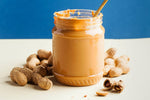
Understanding the Protein Content of Peanut Butter
, by Sandesh Prasannakumar, 9 min reading time
New Year Sale Is Live - Shop Now!
New Year Sale Is Live - Shop Now!
New Year Sale Is Live - Shop Now!
New Year Sale Is Live - Shop Now!
New Year Sale Is Live - Shop Now!
New Year Sale Is Live - Shop Now!
New Year Sale Is Live - Shop Now!
New Year Sale Is Live - Shop Now!
New Year Sale Is Live - Shop Now!
New Year Sale Is Live - Shop Now!

, by Sandesh Prasannakumar, 9 min reading time
Peanut butter is a beloved staple in many households, known for its creamy texture and rich flavor. But is peanut butter high in protein? This question often arises among health enthusiasts, fitness buffs, and anyone looking to maintain a balanced diet. In this comprehensive blog, we'll delve into the protein content of peanut butter, explore its health benefits, debunk common myths, and provide insights into how it fits into a healthy diet.
Peanut butter is a spread made from ground dry-roasted peanuts. It often includes additional ingredients like salt, sweeteners, and stabilizers to enhance flavor and texture. Available in creamy and chunky varieties, peanut butter can be enjoyed on toast, in sandwiches, smoothies, and a variety of recipes.
The short answer is yes, peanut butter is high in protein compared to many other foods. However, the amount of protein it contains can vary based on the brand and type of peanut butter.
A typical two-tablespoon (32 grams) serving of peanut butter provides about 7-8 grams of protein. This amount constitutes a significant portion of the daily recommended intake for protein, making it a valuable addition to a protein-rich diet. For context, the Recommended Dietary Allowance (RDA) for protein is about 46 grams per day for women and 56 grams per day for men.
In addition to being high in protein, peanut butter is packed with other essential nutrients:
Given that peanut butter is high in protein, there are numerous ways to incorporate it into your diet:
While peanut butter is high in protein, it’s beneficial to compare it to other protein sources:
So, is peanut butter high in protein? Absolutely. With about 7-8 grams of protein per serving, peanut butter is a nutrient-dense food that offers numerous health benefits. It supports muscle growth, promotes heart health, aids in weight management, and provides essential nutrients. However, it's important to choose natural or organic varieties to avoid unnecessary additives and to consume it in moderation as part of a balanced diet.
Incorporating peanut butter into your daily meals and snacks can be a delicious and convenient way to increase your protein intake. Whether you're an athlete looking for muscle recovery options, a busy professional needing a quick and nutritious snack, or someone just aiming for a balanced diet, peanut butter can play a valuable role. Remember to pair it with other protein sources to ensure a complete amino acid profile for optimal health benefits.
In summary, understanding the protein content of peanut butter and its health implications can help you make informed dietary choices. Embrace this creamy delight and enjoy its benefits while savoring its rich flavor in various culinary creations.